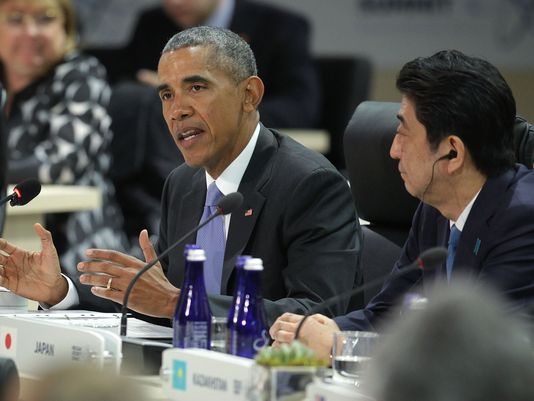U.S. releases inventory of A-bomb materials

WASHINGTON — The United States released a public inventory of its supplies of highly enriched uranium, the material that can be used to make nuclear weapons, President Obama said Friday as he opened the second day of the biennial Nuclear Security Summit.
"That inventory is one that we have reduced considerably," Obama said. "When it comes to our nuclear-powered ships and submarines, we are exploring ways to further reduce our holdings of highly enriched uranium."
It was the first time in a decade the United States released details on its supply of the highly enriched uranium (HEU). It reported 586 metric tons of HEU in the United States in 2013, down from 741 metric tons in 1996.
The inventory includes HEU for "national security or non-national security programs, including nuclear weapons, naval propulsion, nuclear energy, and science," said Myles Caggins, a spokesman for the National Security Council. It also counts HEU that can be converted to low-enriched uranium and HEU in spent nuclear reactor fuel.
The new U.S. figures reflect a reduced supply of HEU worldwide, the White House said. Since the last summit in 2014, 10 nations have removed or disposed of about 450 kilograms — about 990 pounds — of HEU. Argentina, Switzerland and Uzbekistan are now free of HEU, as is the entire region of Latin America and the Caribbean.
Obama opened his summit-related activities Friday with a meeting with allies who helped shape last year's deal with Iran that stopped that nation's nuclear weapons program in exchange for reduced economic sanctions.
"After nearly two years of intensive negotiations and strong sanctions, the countries represented in this room achieved what decades of animosity and rhetoric did not: a long-term deal that closes off every possible path for Iran to build a nuclear weapon and subjects Iran to the most comprehensive nuclear inspections ever negotiated," Obama said.
"It will take time for Iran to reintegrate into the global economy, but Iran is already beginning to see the benefits of this deal," Obama said. "I think it's important to note that this deal does not resolve all of our differences with Iran, including destabilizing activities in the region."
Critics, including Republican lawmakers and presidential candidates as well as the government of Israel, say the agreement gives Iran too much leeway to cheat.Obama also told allies they have improved security of nuclear materials in recent years, but extremists have stepped up efforts to acquire them.
"Our nations have made it harder for terrorists to get their hands on nuclear material," Obama said, but he added that "the threat of nuclear terrorism persists."
On Thursday, Obama and the officials from more than 50 countries conducted a series of meetings and then had a working dinner at the White House. He also met with the leaders of China, Japan, and South Korea to discuss how to confront threats from nuclear-armed North Korea.
One nuclear-armed power did not send any delegates to the security summit: Russia.
Ben Rhodes, Obama's deputy national security adviser for strategic communications, said American and Russian officials continue to work day-to-day on nuclear security issues. He described the Russians' absence from the summit as a "missed opportunity" for them.
This is the last Nuclear Security Summit of the Obama presidency. He organized the first one back in 2010, and they have been held every two years since.
Политика конфиденциальности | Правила пользования сайтом







